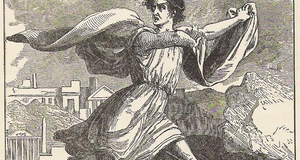Shakespeare's Apemantus: The Amazing, Changing Flat Character in Timon of Athens
By
2010, Vol. 2 No. 03 | pg. 1/1
KEYWORDS:
In William Shakespeare's The Life of Timon of Athens, the character Apemantus is a Cynic philosopher, who delights in presenting the truth to other characters in the most offensive manner possible. He is a secondary character, but an indispensible one. Apemantus provides a line to financial reality for the audience and the characters of The Life of Timon of Athens, and illuminates some of the more subtle details of Timon’s personality. Apemantus is described as “a churlish philosopher” in the Persons of the Play list, and, as a flat character, remains ill-natured throughout the play, although there is an illusion of his change: “It is not that he changes or develops as a character; his voice is consistent from beginning to end. But what are we to make of him and the light he sheds on Timon are much less clear than his nature, and our perspective on him shifts as the play goes on” (Pierce). Apemantus shifts from Timon’s foil to someone similar to him in outlook. He wonders how “men dare trust themselves with men,” a key point in his philosophy (1. 2.42). In contrast, Timon claims that “there’s none/can truly say he gives if he receives” even though he depends on the honesty of men “commanding one another’s fortunes” (1.2.9-98). Their last meeting shows how similar in words they have become when Apemantus asks “Art thou proud yet?” and Timon responds “Ay, that I am not thee,” the inverse of their exchange in act one scene two (4.3.277-78). When Apemantus appears at Timon’s feast, his comments steer the audience’s perception of Timon and the flattering lords, when he appears in the woods, his comments are directed at Timon. The nature of the comments does not change, but the shift changes the type of information Apemantus brings to light. At first, his main purpose is to guide the audience beyond the glamour of Timon’s extravagance, showing them what is actually happening; “I come to observe” (1.2.33). After Timon’s change of fortune, Apemantus reinforces the idea of Timon’s tragic flaw. Without him, it is easier to contribute Timon’s downfall to external sources, as Timon does. “Thou gav’st thine ears like tapsters that bade welcome/to knaves and all approachers. ‘Tis most just/ that though turn rascal” (4.3.215-17).Interestingly, both Timon and Apemantus consider people to be untrustworthy, Timon’s locus of control is external while Apemantus’ seems to be internal. People with an external locus of control tend to blame everything that occurs on situational factors instead of themselves. Because they feel they have little control over situations, an external locus of control may lead such people to become more distressed over unfortunate events than their internally motivated counterparts (Baumeister). Timon accuses the gold of being a “sweet king-killer, and dear divorce/ ‘Twixt natural son and sire” and the “men are the things themselves” as the reason for his ruin, but he clearly does not blame himself. As a reaction to his loss of wealth, Timon rips his clothing off; much like Lear did in King Lear when he began to lose his mental faculties. Timon has not gone insane, but this is certainly an irrational response. For the truly obtuse in the audience, Apemantus points out that “the middle of humanity thou never knewest, but the extremity of both ends” (4.3.300-301). It seems strange that Apemantus should be the one to mention this since Timon “dost affect [Apemantus’] manners,” indicating that Apemantus is also a man of extremes (4.3.199). Of course, Apemantus is not looked upon favorably, either, reminiscent of an excessively insistent religious person; converted to the cause by conviction, as Apemantus is misanthropic because his beliefs are that of a Cynic philosopher, not because he is affecting misanthropy as Timon is. Apemantus’ dramatic exclamation of “O, you gods, what a number of men eats Timon, and he sees ‘em not! It grieves me to see so many dip their meat in one man’s blood” summons an image of Christ (1.2.38-40). However, Timon is not actually a Christ figure. Jesus invited his disciples to take part in a feast symbolizing his body, knowing of his impending betrayal, sacrificing himself for the betterment of others anyway. Timon has no such knowledge. He apparently does not even see the cannibalistic lords eating away at his body, although he “cheers them up” (1.2.41). The comparison of Jesus and Timon makes Timon’s descent seem further and more censurable. Even with the sexual innuendo of “I eat not lords” Apemantus manages to hint at the future. This example is not actual foreshadowing; it does tie in to one of Apemantus’ later metaphors, one of the most memorable images of the play. Several of Apemantus’ cynical comments more concretely foreshadow Timon’s reversal of fortune. “Who dies that bears not one spurn to their graves/ of their friends’ gift? / I should fear those that dance before me now/ would one day stamp upon me. T’as been done. / Men shut their doors against the setting sun” (1.2.133). His truthful, rudely worded insights are warnings for Timon. Unfortunately, they go unheeded because of Apemantus’ abrasive, blunt manner. Apemantus eventually gives up: “Though wilt not hear me now, though shalt not then. I’ll lock thy heaven from thee” (1.2.244-45). He returns to the play only to “vex” Timon, although what he really seems to be doing is saying, “I told you so.” Apemantus’ presence exposes Timon’s character. He allows Timon’s lack of true altruism to shine through the praise of the other characters. Timon desires positive attention and gives handsomely to receive it. Timon allows Apemantus to attend his feast to appear magnanimous, insisting that “thou’rt an Athenian, therefore welcome,” rather than any desire to treat the Cynic well (1.2.34-35). Timon places Apemantus at another table, removing him from the festive group, and, in response to his rude remarks and generally unpleasant demeanor, does not give him the gifts that everyone else receives. Timon tells Apemantus, “if thou wert not sullen/ I would be good to thee” (1.2.2234-5). Apemantus’ presence at the feast draws the lords’ attention to Timon, but because Apemantus’ attention is not flattering, it is only indirectly useful for Timon. During their final meeting, the majority of Apemantus’ lines are focused on revealing Timon’s nature, accusing him of not learning from his mistakes. Apemantus accuses “Hadst thou wealth again/ rascals should hav’t” (4.3.217-18). Despite his new attitude, Timon gives away his newly found gold to whores and thieves, people that normal society would consider rascals at best, effectively proving Apemantus correct. The audience’s intended change in attitude toward Apemantus without a change in his character is an impressive and important accomplishment. The apparent change in Apemantus is caused by the change in Timon. However, Apemantus’ understanding of the nature of people, Timon, in particular, though flawed, accentuates Timon’s attitude change. The audience is greatly influenced by Apemantus’ contemptuous comments, though Timon proves to be resistant to them. Apemantus is crucial to understanding Timon’s personality. The relationship between the two cannot be called friendship, but Apemantus is certainly more valuable to Timon than the money-grubbing acquaintances that epitomize the painter and poet’s relationship with Timon. It is Apemantus’ rejection of Timon’s wealth that makes him a reliable source for information on Timon, despite the fact that he is not objective. The audience, and Timon, needs a commentator whose opinion is not swayed by gifts. ReferencesBaumeister, Roy F., and Brad J. Bushman. Social Psychology and Human Nature, Brief Version. Belmont: Wadsworth, 2007. Print. Pierce, Robert P. "Anecdotal Philosophy to Drama: Shakespeare\'s Apemantus as Cynic." Classical and Modern Literature 22.2 (2005): 77-88. H.W.Wilson OmniFile Full Text Mega. Web. 25 Mar. 2009. Shakespeare, William. "Timon of Athens." The Norton Shakespeare, Based on the Oxford Edition, Second Edition Tragedies (Norton Shakespeare, Based on the Oxford Edition, Second Edition). New York: W. W. Norton, 2008. Print. Suggested Reading from Inquiries Journal
Inquiries Journal provides undergraduate and graduate students around the world a platform for the wide dissemination of academic work over a range of core disciplines. Representing the work of students from hundreds of institutions around the globe, Inquiries Journal's large database of academic articles is completely free. Learn more | Blog | Submit Latest in Literature |












